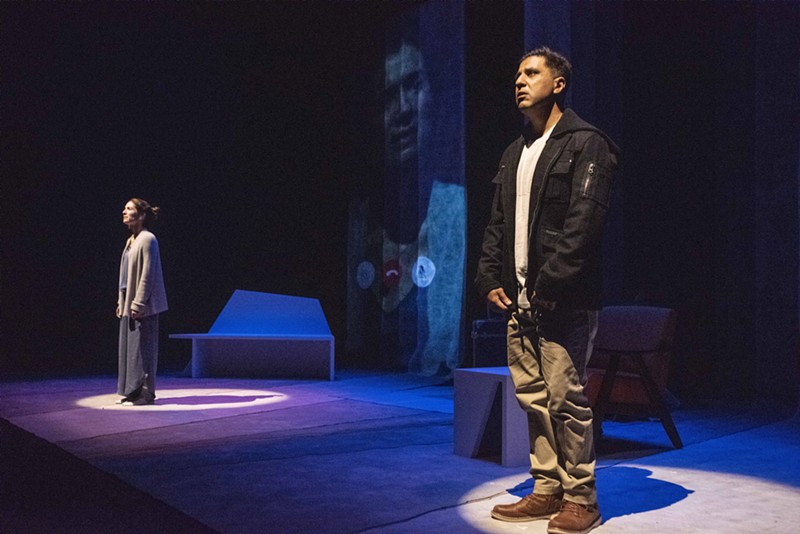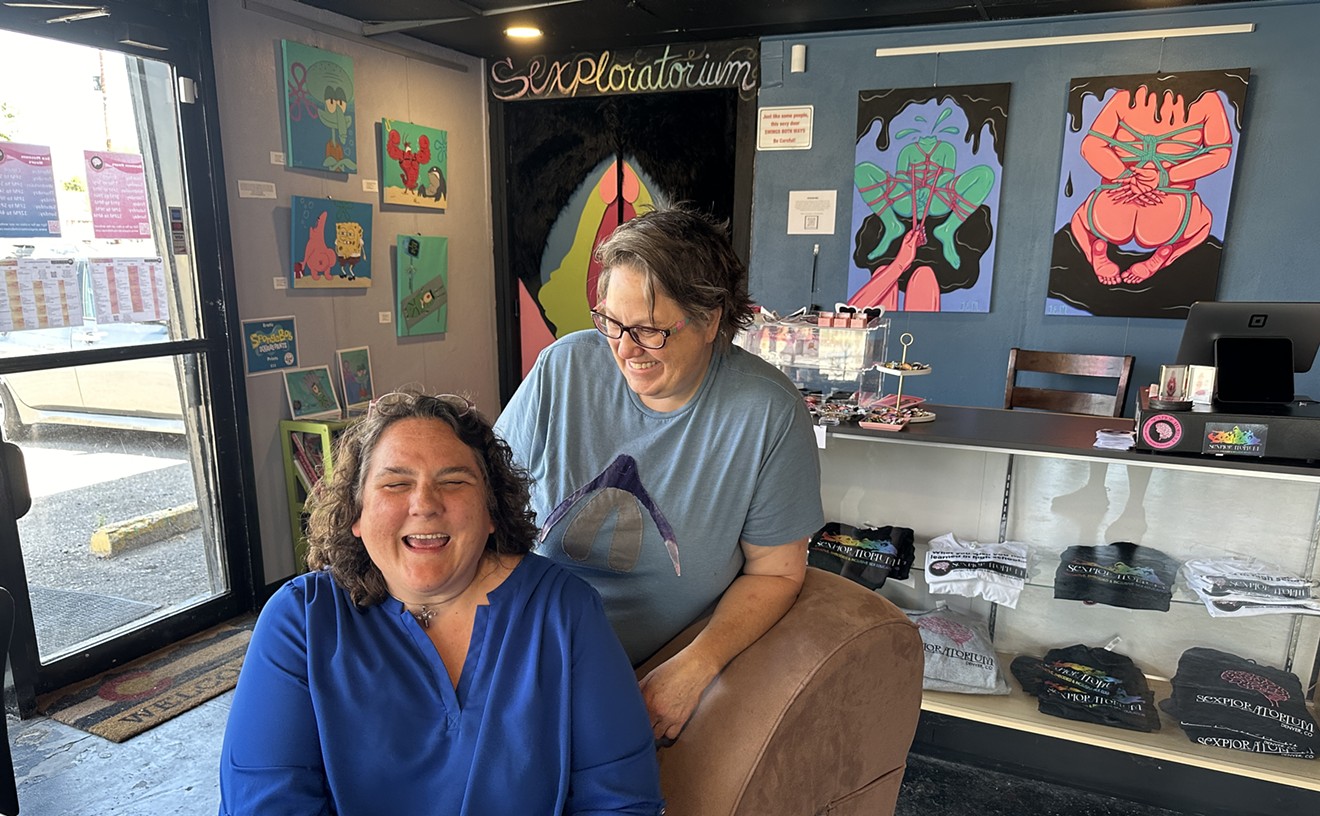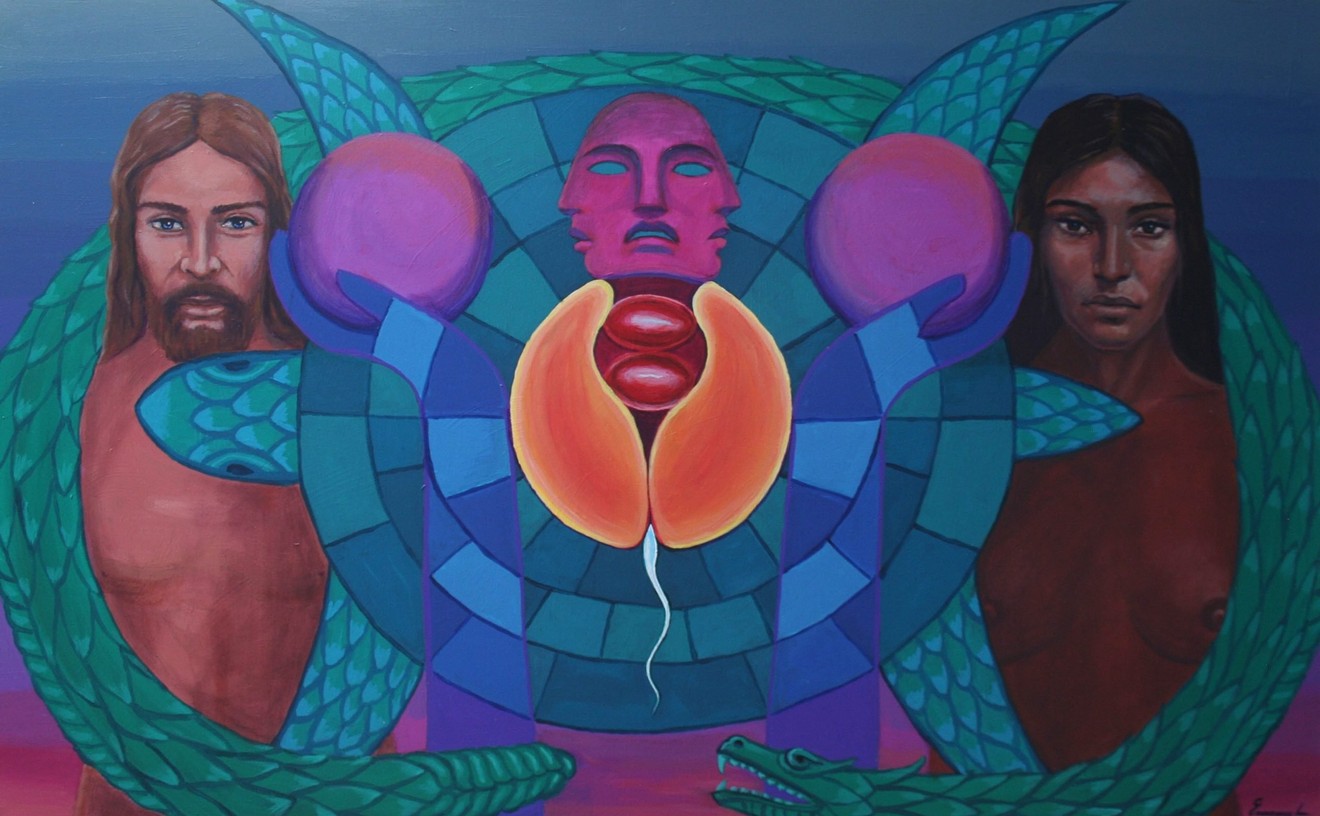"This is a show about language," director Julie Rada says of Letters of Suresh, which will have its regional premiere at Curious Theatre Company.
Through a series of letters that span continents, the production examines the depths of longing and the enduring power of connection. "It was first produced in 2021, and to me, it is very much a product of the pandemic," Rada continues. "Although there is no global pandemic in Letters of Suresh, all of these people are isolated and examining their habits, as many of us did during the pandemic. There's no physical touch in the play, which was also very interesting to stage. It's all told through these old-school letters, which feels like a throwback to when people were savoring slower processes, like making sourdough bread, knitting and doing jigsaw puzzles during the pandemic."
Letters of Suresh, which follows the journey of teenage origami expert Suresh, is somewhat of a sequel to Rajiv Joseph's 2008 play Animals Out of Paper. Although that play examined the relationships between educators and students, the scope of Letters of Suresh is far wider. It starts with a letter from Melody, a writing teacher who has inherited her great uncle's possessions following his recent death and finds letters between him and Suresh. She writes to Suresh to ask if he wants to keep the correspondence.
Through a series of flashbacks, we learn how Suresh and Melody's uncle, Father Hashimoto, met at an origami festival in Nagasaki and became pen pals. Their letters covered topics ranging from relationships to religion, which occasionally strained their friendship and caused them to take communication breaks. Suresh goes to Japan after finding out about Hashimoto's passing and, while traveling, stumbles upon the priest's last unanswered letter, which provides insight into his enigmatic past.
The characters' journey toward accountability, self-forgiveness and reconciliation is a theme in the play that Rada finds particularly poignant, as it mirrors the broader struggle for peace in a fractured world. "Every single one of these characters is grappling with something they regret and want to make amends for," Rada explains. "I think that we live in a culture that's pretty allergic to accountability, and I am so moved by the way these characters apologize and seek forgiveness, both on an individual level and also on a global scale. It's like: Can we ever be accountable for the destruction of Nagasaki? Can we be accountable to ourselves when we let ourselves down?
"We're in this moment where there are multiple devastating wars happening right now," she continues, "but I like that the people in this play are seeking peace that's been earned, because true peace comes with sacrifice, and comes from making amends and reconciling."
Origami is another recurring motif in the play, serving as a symbol of both fragility and resilience, and connecting the characters' stories together. "I started doing origami before we even got into rehearsal, because although I had done it when we were kids, not to this extent," says Hossein Forouzandeh, who plays Suresh. "Knowing that Suresh is an origami genius along with a mathematical genius, he's able to see the paper and he's able to do some really cool things. I wanted to at least be somewhere close to what he's able to do, or at least have a basic foundation for it, so I started playing with origami and stuff. And then that also became one of our bonding activities as a cast; the whole cast is doing origami all the time — there are cranes everywhere!"
Rada and her ensemble cast, including Forouzandeh, Desiree Mee Jung, Anne Penner and Peter Trinh, meticulously crafted the production's rhythm, embracing the play's musicality and poetic language. "It's an incredibly compelling script for me," Rada shares. "There's really only one scene that has dialogue in it, and it's interesting how that works, because it's this surprise; it's delightful when you do have that break in the form. There are very few transitions, since a lot of the letters have a quality of being open-ended; there's no sign-off; it's just all of a sudden two weeks later, three hours later, three years later. We've had to sort of make sense of that in this production and do some choreography to stitch these worlds together."
Beyond the script, the production's design mirrors the play's themes of impermanence and beauty. The Japanese aesthetic of wabi-sabi, which finds beauty in imperfection, is woven into every single design element. "Rajiv Joseph has given me an artist's playground of symbols to play with, so I felt like that needed to be reflected in the design that we have as well," Rada says. "There's nothing in the script explicitly about this, but the ideology of wabi-sabi has everything to do with this play; it's about impermanence, beauty and imperfection. When things get cracked, it increases the value because it's the ways we're scarred or hurt that actually make us into the beautiful creatures we are. It's a very organic design aesthetic that says everything's beautiful, because it's not perfect."
The unique form of the play, predominantly composed of letters and origami exchanged between characters, adds an intimate and reflective layer to the narrative. Because of its structure, Letter of Suresh is able to examine religious discourse, secularism and faith between Father Hashimoto, played by Trinh, and Suresh, which shines a light of understanding in a world that is becoming more and more divided.
"We live in a time where people who disagree don't talk to each other," Rada observes. "There is a bit of tension, but Suresh and Father Hashimoto keep coming back to talk and find understanding. After having these conversations, they sort of meet in the middle and make space for one another's viewpoint, and that's rare these days.
"I think people who feel alienated and are longing for a connection can see this play as a way to take a small, simple step toward connecting with others," Rada continues. "Many of us are on information overload; we have notifications dinging at us, a full inbox of email, tons of social media messages, plus the news cycle and our jobs, so I love that this play has a suspension of time. I think it will be a nice opportunity to create space for reflection for people who are busy and overwhelmed to take a moment to drop into this really human story. I'd also say it's a good play for people who are working on their relationships and learning to apologize. These characters are really flawed and make a lot of mistakes, but they learn from them, they grow from them, and we see the fruits of their self-scrutiny in the play."
Letters of Suresh opens Saturday, November 11, and runs through Saturday, December 9, at Curious Theatre Company, 1080 Acoma Street. Get tickets at curioustheatre.org.

Audio By Carbonatix
[
{
"name": "Air - MediumRectangle - Inline Content - Mobile Display Size",
"component": "12017618",
"insertPoint": "2",
"requiredCountToDisplay": "2",
"watchElement": ".fdn-content-body",
"astAdList": [
{
"adType": "rectangle",
"displayTargets": "mobile"
}
]
},{
"name": "Editor Picks",
"component": "17242653",
"insertPoint": "4",
"requiredCountToDisplay": "1",
"watchElement": ".fdn-content-body",
"astAdList": [
{
"adType": "rectangleLeft",
"displayTargets": "desktop|tablet"
},{
"adType": "rectangleRight",
"displayTargets": "desktop|tablet|mobile"
}
]
},{
"name": "Inline Links",
"component": "18838239",
"insertPoint": "8th",
"startingPoint": 8,
"requiredCountToDisplay": "7",
"maxInsertions": 25
},{
"name": "Air - MediumRectangle - Combo - Inline Content",
"component": "17261320",
"insertPoint": "8th",
"startingPoint": 8,
"requiredCountToDisplay": "7",
"maxInsertions": 25,
"watchElement": ".fdn-content-body",
"astAdList": [
{
"adType": "rectangleLeft",
"displayTargets": "desktop|tablet"
},{
"adType": "rectangleRight",
"displayTargets": "desktop|tablet|mobile"
}
]
},{
"name": "Inline Links",
"component": "18838239",
"insertPoint": "8th",
"startingPoint": 12,
"requiredCountToDisplay": "11",
"maxInsertions": 25
},{
"name": "Air - Leaderboard Tower - Combo - Inline Content",
"component": "17261321",
"insertPoint": "8th",
"startingPoint": 12,
"requiredCountToDisplay": "11",
"maxInsertions": 25,
"watchElement": ".fdn-content-body",
"astAdList": [
{
"adType": "leaderboardInlineContent",
"displayTargets": "desktop|tablet"
},{
"adType": "tower",
"displayTargets": "mobile"
}
]
}
]











